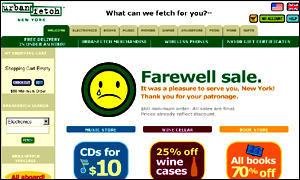I remember Web 1.0 home-delivery operations from 15 years ago like Urbanfetch, which looked like good ideas on paper, provided you weren’t wearing your reading glasses. In the age of smartphones and improved algorithms, such concerns are trying to get going again. Still seems dubious. From Claire Cain Miller at the New York Times Magazine:
“In the tech crash of the early 2000s, on-demand delivery services like Kozmo and Webvan weren’t just among the most colossal failures. They also became a sort of grim joke, symbolizing the excess that portended the bust. Afterward, conventional wisdom hardened: Web-enabled delivery was not a good business because it simply cost too much to build warehouses, manage an inventory and pay drivers. There was too little opportunity to recoup expenditures in delivery fees; people will pay only so much for toilet paper to be delivered before they decide to fetch it themselves.
But something is in the air of late, making hindsight blurry. Despite the early demise of Rewinery and the shrunken ambitions of others, such as eBay Now, similar start-ups with names like Caviar, SpoonRocket and DoorDash have raised half a billion dollars in investment in the last year, according to CB Insights, which tracks venture capital. Even Louis Borders, the founder of Webvan (as well as the Borders bookstore chain, another Internet casualty), is at work on a grocery delivery start-up. Uber is using the $1.4 billion it just raised to expand beyond delivering people to delivering things. Meanwhile, venture capitalists joke that every other entrepreneur they meet pitches an ‘Uber for X,’ bringing goods and services on demand: laundry (Washio), ice cream (Ice Cream Life), marijuana (Eaze) and so on. Investors are stuck wondering whether this is 2000 all over again, or whether this new breed of delivery start-ups can succeed where the last crop so famously failed.
John A. Deighton, a Harvard Business School professor who wrote a case study on Webvan, likes to compare the delivery business to shining shoes. ‘You make as much profit on one shoe as you do on a thousand shoes,’ he said. ‘There’s just no scale.’ In years past, it was difficult for Deighton to even teach his students about Webvan, because its fatal flaws were so obvious. They didn’t understand how the euphoria of the dot-com boom could have obscured its shortcomings. But in the last year, he has been asked to teach it three times. ‘Something has changed,’ he said.
The biggest change is that the companies are trying to improve same-day delivery with software — and, at the same time, are distancing themselves as far as possible from the physical supply chain that killed their ancestors.”


